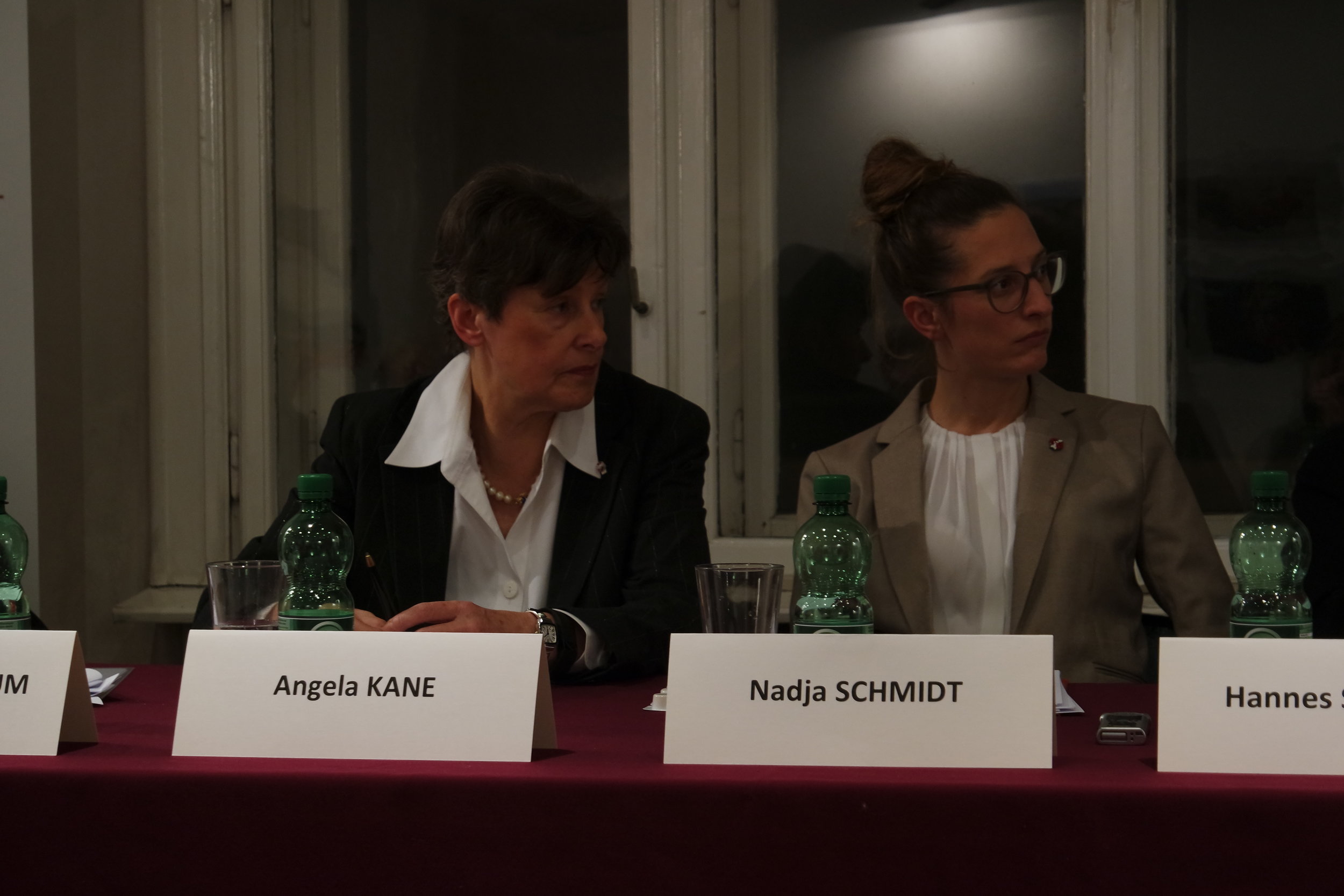by Eva Kvasnicka and Marlene Prinz
Due to the global ban treaty of nuclear weapons, the International Institute for Peace organized a panel discussion in December 2017. The treaty was initiated by the International Campaign to Abolish Nuclear Weapons, ICAN, a coalition of non-governmental organizations in one hundred countries promoting adherence to and implementation of the United Nations nuclear weapon ban treaty. Since their founding, they established a powerful groundswell of public support for the abolition of nuclear weapons. Changes to the normative order of nuclear disarmament and non-proliferation are underway. Frustrated with decades of political deadlock, on July 7 this year, 122 states voted in favor of a Treaty on the Prohibition of Nuclear Weapons at United Nations headquarters in New York City. Some months later, on 10th of December, the Norwegian Nobel Committee awarded ICAN with the Nobel Peace Prize. The agreement was formed against the will of the nuclear weapon states and their alliance partners. The main argument for the holding of these weapons is still it’s deterrent function. Current political situations regarding for example North Korea are often pointed out in that context.
Nadja Schmidt, chairwoman of ICAN Austria, emphasized that through their campaign the debate on nuclear weapons got reshaped and generated a momentum towards it’s elimination. She mentioned that Austria had a major impact on ICANs reward of the Nobel Peace Prize. The country advocated that the legal gap should be diminished and enrolled it to an UN process by which the nuclear ban formed itself. Mentioning Austria, Robert Gerschner, head of the department II.8.a., nuclear weapons, IAEO, CTBTO Prep Com and NPT, Federal Ministry of Justice, Integration and Appearance, had the opportunity to explain Austria’s involvement in ICANs Nobel Peace Prize win.
A change of dialogue was needed, therefore ICAN approached the topic not as deterrence theory, but from its humanitarian side. Nuclear weapons need to be abolished, they are the last mass destructing weapons that are not prohibited yet. It’s necessary to bring the humanitarian aspect into focus and inform governments of all countries of the consequences of these weapons. Speaking about the humanitarian aspect of nuclear bombs, Werner Kerschbaum attended the panel as the general secretary of the red cross Austria and pointed out that the red cross was involved in rescuing victims of nuclear attacks. For example, in Nagasaki, Japan. Today it is important to inform the civil society and bring awareness of the humanitarian consequences of nuclear weapons to the public. As it has proofed, an effective way is talking directly with victims of such attacks. Kerschbaum hopes for the treaty to expand by one of the nuclear umbrella states. If one of the nuclear weapon states would join the treaty on the Non-Proliferation of Nuclear Weapons it would not only have an impact on the normative order of global nuclear disarmament, but might convince other nuclear umbrella states to also join the treaty. Sadly, regional insecurities make the U.S. allies to states who rely on this kind of nuclear “coverage”. States are depending on nuclear deterrence guarantees from Washington and therefore reject the new ban treaty. Even though these states are not part of the treaty, they should respect the ban for what it is: a powerful statement embracing peace and disarmament. It is important that the treaty will not build a chasm between those who are part of the ban treaty and those who are not.
Angela Kane, former high UN commissioner for disarmament, vice-president of the IIP, responded to the question, if the weapons deterrent function is still valid, regarding rapidly advancing artificial intelligence and the forecast of emerging technologies. Optimistically Kane considers it a sign of encouragement that some of the world’s leading robotics and artificial intelligence pioneers have called on, to ban the development and the use of lethal autonomous weapon systems. Moreover, she addresses Europe, regarding the mitigate of these growing risks. Europe should step in where the United States no longer uphold multilateral commitments and it should speak out in favor of disarmament, arms control and nonproliferation. Especially preventing further escalations in Ukraine, which might further strain the arms control agenda of both, NATO and Russia as well as Washington and Moscow. Therefore, EU member states should in parallel speak out strongly in favor of preserving the bilateral U.S.-Russian arms control agenda, both in Washington and Moscow. Also, the EU should step up for the preservation of the Iran Nuclear Deal. Europe’s role today is the strengthening of the role of the civil society groups and particularly of young organizations advocating disarmament. Campaigns on disarmament and nonproliferation should become a prime target. ICAN and others remind us that constant engagement can lead to enormous results.
This report is based on the Panel discussion at the IIP on the 18th of December 201
Moderation
HANNES SWOBODA,President IIP, former MEP
Panel
HEINZ GÄRTNER, Prof. of Political Sciences Univeristy Vienna, Member of the Advisory Board of the IIPIIP
ROBERT GERSCHNER, Chairman II.8.a, Nuclear Weapons, IAEO, CTBTO Prep Com and NPT, Feder ministry of European and Foreign Affairs
ANGELA KANE, Vice President IIP, former UN high Commissioner for Disarmament Affairs
WERNER KERSCHBAUM, General Secretary, Austrian Red Cross
NADJA SCHMIDT, Chair, International Campaign to Abolish Nuclear Weapons, Austria (ICAN)












